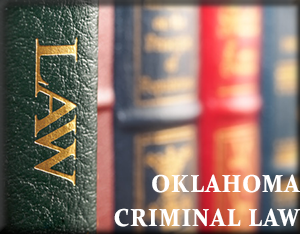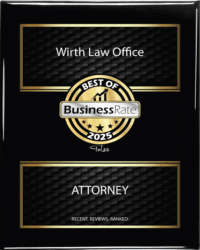Oklahoma Criminal Statutes: Many Titles
Title 21: Oklahoma Criminal Code

In Oklahoma, criminal laws are codified primarily in Oklahoma Statutes Title 21. While we might informally call Okla. Stat. tit. 21 the “Oklahoma penal code” or “Oklahoma criminal code,” Title 21 is formally codified under the simple heading of “Crimes and Punishment.”
However, Title 21 is not the only place in Oklahoma state laws where Tulsa attorneys find crimes and punishment listed. A Tulsa attorney must often review several titles in Oklahoma statutes to establish what laws affect what might otherwise appear to be a simple criminal charge.
Oklahoma Criminal Statutes:
Title 21: Crimes and Punishment
Title 22: Criminal Procedure
Title 47: Motor Vehicles
Title 63: Drug Laws
Title 57: Pardons and Registration
Title 22: Oklahoma Criminal Procedure
Many criminal laws in Oklahoma are found in other parts of Oklahoma state law. Oklahoma criminal lawyers turn to Title 22 to find procedures for service of warrants and search warrants, for arrest, for posting bond, for criminal trials, for appeal of criminal convictions, and even procedures for administration of the death penalty. Oklahoma criminal court rules are codified in Title 22.
Yet in Oklahoma’s Title 22 we also find some crimes and criminal penalties listed, including those for violating a protective order, for racketeering, for failing to disperse during a riot, for jumping bail, or for possession of illegal gambling paraphernalia.
Title 22 further spells out ways to clear a criminal record. Oklahoma criminal procedure offers two types of expungements in Oklahoma – Section 18 expungement and Section 991(C) expungement.
Title 47: Oklahoma Motor Vehicle Code
A large number of people facing Oklahoma criminal charges find their offenses listed in Oklahoma Title 47 — the motor vehicle code, or as it is formally titled “Motor Vehicles.” In Okla. Stat. tit. 47, we find penalties for driving with a suspended or revoked license, for failure to report an accident, for speeding, for reckless driving, and for various other traffic violations.
Title 47 also codifies Oklahoma DUI law. Penalties for driving under the influence, for driving while intoxicated, and for negligent homicide involving a motor vehicle are all found in the Oklahoma motor vehicle code.
Title 63: Oklahoma Drug Laws
Oklahoma drug laws are codified in Oklahoma Statutes Title 63 — titled “Public Health and Safety.” In this instance, Oklahoma laws formally spell out an “Oklahoma Public Health Code.”
The health code, comprising Chapter 1 of Oklahoma Title 63, prescribes criminal penalties related to numerous health-related activities including those that involve nursing homes, psychiatric care facilities, and other health facilities. Drug laws in Oklahoma, however, start in Chapter 2.
Titled the “Uniform Controlled Dangerous Substances Act” Oklahoma Title 63 drug laws are listed in Okla. Stat. tit. 63 § 2-101 – 2-904. The matrix of criminal penalties and Oklahoma drug schedules found in Oklahoma drug law account for the legal basis under which much of Oklahoma’s prison population is detained.
Title 57: Pardons, Parole, and Sex Offender Registration
For those confined to Oklahoma prisons, Oklahoma’s Title 57 spells out the law under which their daily lives are directed, and under which they may seek parole. Rules and requirements for pardons in Oklahoma are also listed in Title 57.
Oklahoma’s Mary Rippy Violent Crime Offenders Registration Act requires people convicted of certain violent crimes to comply with registration procedures during and for 10 years after completion of a criminal sentence. Oklahoma law and related penalties for violent offender registration are found in Title 57.
Likewise, Oklahoma’s Sex Offenders Registration Act is codified in Title 57 as Okla. Stat. tit. 57 § 581 – 590.2.
Other Oklahoma Criminal Laws
Although Oklahoma Statutes Title 21 embodies the greater part of Oklahoma criminal law, and the several titles mentioned on this page highlight significant exceptions, other Oklahoma crimes can be found throughout Oklahoma law.
Administrative laws often include criminal or civil penalties for violations. Title 37A — the Oklahoma Alcoholic Beverage Control Act — provides criminal penalties for underage buyers who tender a fake ID or for retailers who sell alcohol to minors. Civil procedures found in Oklahoma Title 12 prescribe penalties for contempt of court that can result in jail time.
Consult an Oklahoma Criminal Attorney
In any matter related to Oklahoma law, a quick check of the most obvious Oklahoma statute might not tell the whole story. In a situation that could result in fines, probation, jail time, a prison sentence, or a criminal record, it is important to seek the counsel of an Oklahoma criminal attorney who has studied Oklahoma criminal laws.
To schedule your initial strategy session with an Tulsa criminal attorney, call Wirth Law Office at 918-879-1681 or send your question using the form at the top of this page.




























